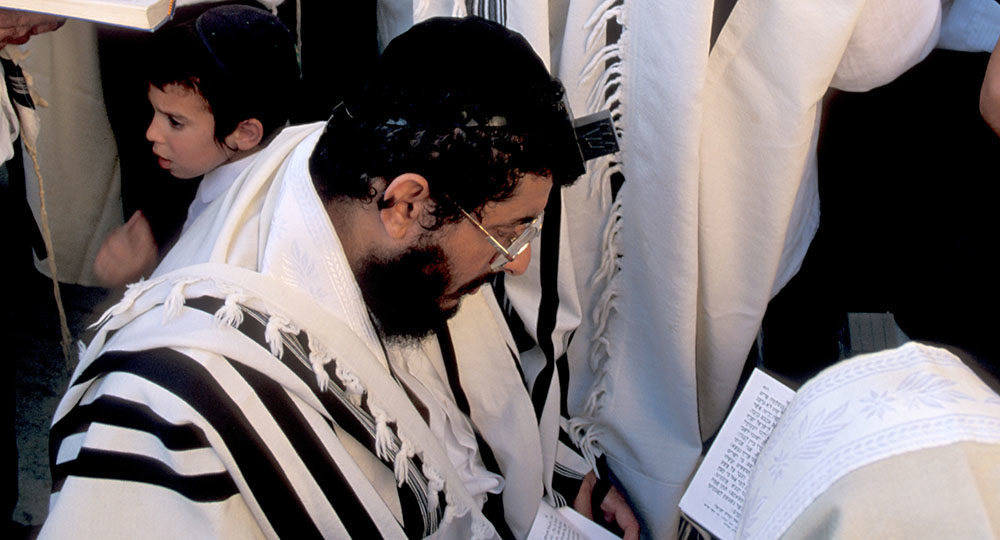The Shema: How Much of Me Does God Own?
Hear, O Israel: The Lᴏʀᴅ our God is one Lᴏʀᴅ: And thou shalt love the Lᴏʀᴅ thy God with all thine heart, and with all thy soul, and with all thy might. And these words, which I command thee this day, shall be in thine heart; And thou shalt teach them diligently unto thy children, and shalt talk of them when thou sittest in thine house, and when thou walkest by the way, and when thou liest down, and when thou risest up. And thou shalt bind them for a sign upon thine hand, and they shall be as frontlets between thine eyes. And thou shalt write them upon the posts of thy house, and on thy gates (Dt. 6:4–9).
The young man, still a teenager, performed a number of rituals each day. The first was to deliver the daily newspaper. He got up very early, delivered the papers, and returned home before the rest of the family was even awake. Then, just as the sun was rising, he would wrap the long black leather strap of his tefillin around his left arm. At the end of the strap was a tiny wooden box which he positioned so that it pointed to his heart. A second tiny wooden box was placed between his eyes and secured with two leather straps tied behind his head. With these in place, and a yarmulke covering his head, he put his talks over his shoulders. Now he was ready to pray:
Shema Yisroel! Adonoi Elohenu, Adonoi Echod …
The Shema (pronounced Sh’mah): What is this prayer that is recited daily by observant Jews? What is the meaning of these Hebrew words that even the most secular Jew likely remembers from his childhood?
The Shema is probably the one aspect of Judaism with which all Jews identify. The Shema is from the Torah, found in Deuteronomy 6:4–9. It is not so much a prayer as a statement:
Hear, O Israel: The Lᴏʀᴅ our God, the Lᴏʀᴅ is one.
Rabbi Hayim Halevy Donin calls it a “declaration of faith.”* The Shema links Jews together. The Shema is the most important prayer a Jew can pray. It can, however, be the statement that keeps him from a relationship with the Messiah when it should be the one that causes him to look for Him.
Reciting the Shema
I was that young man who prayed faithfully each morning. I was less faithful with the evening ritual, even though it was equally important. The Bible says it should be said “when thou liest down, and when thou risest up” (Dt. 6:7). It is to be recited with great respect. We are talking to the Almighty God, which is not to be taken lightly. Many Jewish people say the prayer with their eyes closed, in order to concentrate and focus on the King of the universe. The Encyclopaedia Judaica tells us that the followers of Rabbi Shammai taught that the Shema should be said standing in the morning and lying down in the evening. According to the school of Rabbi Hillel, the man’s position was not important so long as he recited the Shema twice a day.* Today most would agree that what is important is that it is said, without regard to one’s physical stance while saying it.
The important principle of the Shema is that it incorporates the concept of the whole man. Numbers have always held great significance for the Jewish people. Rabbis have added the three words el, melekh, and ne’eman (God, king, and faithful) to the existing 245 words of the prayer, bringing the total to 248. According to Jewish tradition, the human is made up of 248 parts. Thus, the Shema is for the whole man.
Reciting the Shema is not a problem for most Jewish people because most have it memorized. I knew it in kindergarten. No, reciting it is not the problem. Fulfilling the requirements of the Shema is usually more difficult.
Requirements of the Shema
To truly fulfill the precepts of the Shema requires an unparalleled commitment.
… thou shalt love the Lᴏʀᴅ thy God …
Exodus 21:2–6 tells us that a slave could be set free after six years of service. However, if, for the security of his family or his love for his master, he wanted to stay in service, provision was made to do that. The passage goes on to say that the master would pierce the slave’s ear with an awl, making him his servant for life. The love of this slave for his master was thus shown to be very powerful. When a Jewish person recites the Shema, whether he knows it or not, he is talking about a powerful love. In a sense, it is this picture of slave love, a desire to commit oneself to another for life. The commitment is based on love.
… thou shalt love the Lᴏʀᴅ thy God with all thine heart …
In Hebrew, labab has the idea of will or intention. In other words, I must love God with all my will.
… soul … The Hebrew word nephesh has the idea of life. I must love Him with my life.
… might … This Hebrew word is mo’ed. I must love God with all my strength.
J. McBride, as quoted in the Theological Word Book of the Old Testament said, “The three parts of Deuteronomy 6:5 rather than signifying different spheres of biblical psychology, seem to be semantically concentric. They were chosen to reinforce the absolute devotion to God.”
And these words . . . shall be in thine heart.
It is clear, then, that the person who prays this prayer and means what he says would want to give his whole self to God, to hold nothing back. God would own him body, soul, and spirit. Contrary to an over-used line, popular when I was in high school, love does not mean “never having to say you’re sorry.” Rather, if I have given myself over completely to someone, I would want to ask forgiveness immediately if I hurt that person. Not to do so would mean I have only a passing interest, or none at all.
And thou shalt teach them diligently unto thy children …
A second requirement of the Shema is an undaunted compulsion. Moses said that these words should be taught diligently. The Hebrew word for diligence means to sharpen. The procedure for sharpening a blade of any kind requires going over it again, and again, and again, and again. When teaching our children about our commitment to God, we are compelled to repeat it time and again, patiently and lovingly.
We should also be talking about our commitment. In Hebrew school we learned that the Talmud teaches that every person has only so many words to speak. The teacher said that when your words are used up, you are dead. This bothered me, and I said, not to be funny, “If this is so, I would have been dead already!” Our commitment is to be so strong that God is always on our lips.
… and shalt talk of them when thou sittest in thine house …
This instruction refers to our time. We have more leisure time than any other civilization in history. We should be using that time to speak of God and His commands..
… and when thou walkest by the way …
We do so many things “by the way.” We have our jobs, our families, our sports, our hobbies, and yet we are told that God is the person we should be talking about.
… and when thou liest down, and when thou risest up.
God should be on our lips throughout the day. He is to be taught about and talked about.
And thou shalt bind them [the words] for a sign upon thine hand, and they shall be as frontlets between thine eyes.
The Jewish person literally binds the Scripture to his arm and head with the leather straps of his tefillin. They are a sign of his commitment.
And thou shalt write them upon the posts of thy house, and on thy gates.
In Jewish households even today a mezuzah (a small metal box containing the Shema) is nailed to the doorpost, a sign of the family’s commitment to their Jewish traditions.
Reflecting on the Shema
Reciting the requirements of the Shema is never enough. We must reflect on them. Deuteronomy 30 tells us that the Word of God is near to them (the Jewish people). This is very true. It is read in the synagogue, it may be bound as a sign, it may be posted on the door, it may even be on a bookshelf in a Jewish household. Most Jewish people know the Shema, if nothing else, by heart. But unless they have a personal relationship with the Messiah of Israel, the Word is not in their hearts. The prophets say that the Jewish people have eyes to see, but they don’t see; ears to hear, but they don’t hear; hearts to understand, but they don’t understand (cp. Isa. 6:9; Jer. 5:21; Ezek. 12:2).
Many Jewish people wear a necklace with the Hebrew letter chi (life) on it. For the religious person, life means loving God. Loving God means listening to His Word. The Apostle Paul wrote in his second letter to the Corinthians that the Word of God is read to this day, yet a veil covers their eyes (2 Cor. 3:14).
What about us, Christian friend? We are taught about God. We have Sunday school, Sunday morning services, Sunday evening services, and mid-week prayer meetings. We talk about what God has done in our lives. Our bookstores bulge with available material. All this is good.
But there is more! We can learn from our observant Jewish friends and their commitment. They are not ashamed of what they are. They let the world know in a tangible way. Yet they don’t have the reality of God. They have the outside, but not the inside. Many of us, however, know the reality of God; our hearts understand, but we don’t let the world see. Is your love for God so strong that you will bind His Word and teach, talk, and write about Him for all to see? Do your neighbors know from outward signs that you are a Christian, just as we would know an observant Jew if we saw him?
We tell our Jewish friends that if they love God with all their heart, soul, and mind, they should be ready to do what He asks in His Word. We tell our Christian friends that if they love God with all their heart, soul, and mind, they should be ready to put their commitment into action.
Let Him examine our commitment. May we prove worthy for His sake.







